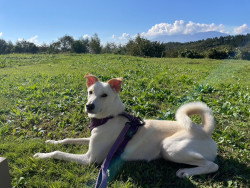
April 29, 2010
Animal Refuge Kansai
The NPO marks 20 years of finding homes for abandoned animals
By Metropolis
Originally published on metropolis.co.jp on April 2010

Photo courtesy of ARK
To put Japan’s pet boom in perspective, consider this fact: there are now more pets than children in the country. Yet as more people learn to appreciate the joy of sharing their lives with a dog or cat, there’s a darker side to the numbers. Japan’s pet industry lags behind most other wealthy nations in terms of how it treats its animals. The increased demand for pets, coupled with a lack of understanding about the responsibilities of ownership, has led to a crisis of mistreated and abandoned animals.
Luckily, Animal Refuge Kansai is around to help. As the welfare organization celebrates its 20th birthday this year, founder Elizabeth Oliver (left) took time to speak with Metropolis.
“ARK has grown from a very small group of friends and volunteers who helped me in the beginning, into a well-known and much larger organization,” she says. “We now look after about 500 animals with over 30 staff.”
The turning point for ARK was the Great Hanshin Earthquake in 1995. In addition to a grave human toll, the disaster left many animals wandering the streets. ARK’s resources at the time were nowhere near sufficient to cope with the need, but with the help of some timely media exposure, they were able to raise money for more staff and additional facilities. The organization ended up rescuing 600 animals that year.
Things haven’t slowed down since. ARK expanded to include a Tokyo office in 2005, and together the two branches have “rehomed” more than 3,000 dogs and 1,000 cats.
“Every year, we have a reunion of dogs which have found new homes,” Oliver says. She calls the experience the most important testament to ARK’s achievements. “They come with their owners, who are so proud of them. [They] look so good and obviously adore their owners.”
In addition to rescue work, ARK focuses on advocacy and education. But this is particularly difficult, Oliver says, because of a variety of institutional failings. Among the stumbling blocks the group has encountered are the mistrust local authorities have towards animal advocates; the inability of Japanese advocacy groups to work together; and the reluctance of the courts to prosecute animal cruelty cases. All of which means that Japan’s standards for animal care lag far behind the West.
“Animals are the least of our problems—they are grateful for any kindness one can give to them,” Oliver says. “It’s the people that are the problem.”
ARK seeks to raise awareness by holding regular adoption events and other community outreach projects. In February, as part of the anniversary celebrations, the group organized a large photo exhibition in Omotesando, featuring photographs of former and current shelter animals. The show drew 300-400 visitors a day and exceeded ARK’s fundraising expectations. But most importantly, it showed locals what kind of wonderful animals are available for adoption.
“So many people go to pet shops and are charmed by the variety of puppies they see in the glass cages there,” Oliver says. “So often they buy on a whim without considering if they should really be getting a dog—how much time, how much space, how much money it will take.”
This pragmatism is typical of ARK, and it has been key to providing a high level of care. The group takes in only as many animals as it can properly look after, and relies on its network of foster homes to take care of the rest. Soon, however, their capacity is going to be expanded with the construction of a new facility in Hyogo.
“We bought the land… two years ago after many years of searching for the right place,” Oliver says. “This new project will include a shelter and a sanctuary, a community clinic open to animals outside ARK at low costs, and a training/education center.”
Hundreds of thousands of unwanted animals end up being euthanized each year in Japan, but thanks to ARK’s efforts, thousands were spared that fate and are now living out their days with a loving family. Here’s hoping the group will be around for another 20 years to help many thousands more.
To find out more about ARK, see http://arkbark.net.







